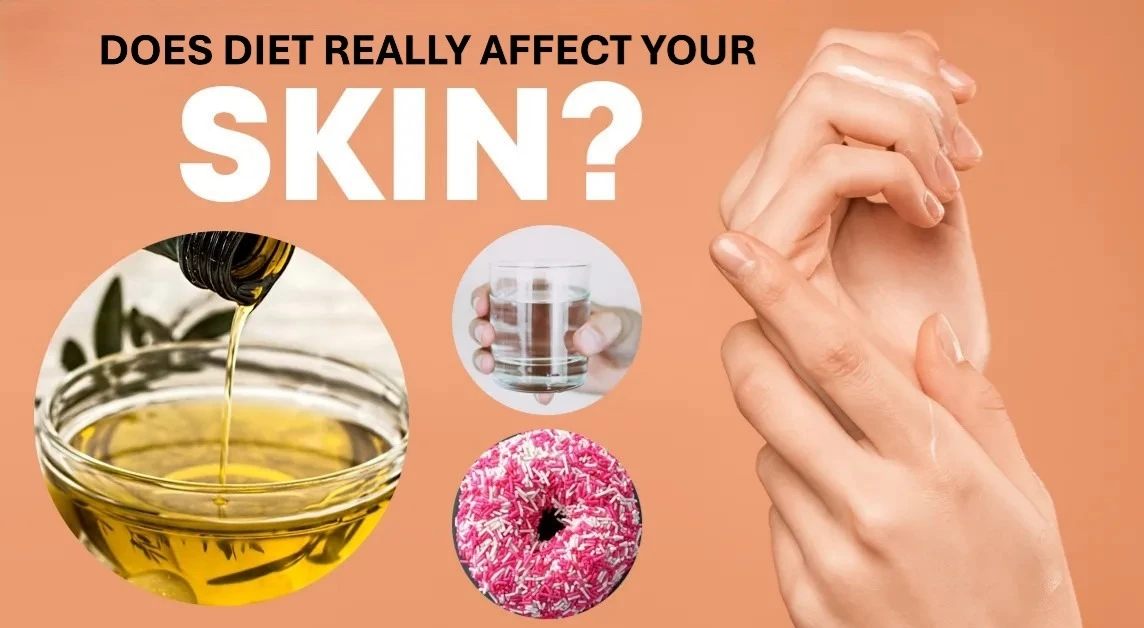Does diet really affect your skin?
Does Diet Really Affect Your Skin?
Yes, your diet plays a significant role in the health and appearance of your skin. While skincare products treat the surface, what you eat impacts your skin from within. Nutrients from food help build skin cells, fight inflammation, and support collagen production. A poor diet can lead to dullness, breakouts, and premature aging, while a well-balanced diet can contribute to clear, glowing skin.
How Diet Impacts the Skin
-
Inflammation and Acne
One of the most well-established connections is between inflammation and breakouts. Diets high in sugar, dairy, and refined carbohydrates (white bread, pastries, soda) can spike blood sugar levels. This triggers an increase in insulin, which may lead to excess sebum (oil) production and clogged pores—two key causes of acne.
Foods to Limit for Acne-Prone Skin:
-
Sugary snacks and drinks
-
White bread and pasta
-
Full-fat dairy (especially skim milk)
-
Processed or fast foods
Instead, focus on low-glycemic foods (like oats, sweet potatoes, and legumes) that help regulate blood sugar and reduce breakouts.
-
Antioxidants and Aging
Free radicals—unstable molecules caused by pollution, sun exposure, and stress—damage skin cells and accelerate aging. Antioxidants neutralize these free radicals and protect your skin’s elasticity and smoothness.
Skin-Loving Antioxidants:
-
Vitamin C (citrus fruits, strawberries, bell peppers): helps produce collagen and brightens the skin.
-
Vitamin E (nuts, seeds, avocados): strengthens the skin barrier.
-
Beta-carotene (carrots, sweet potatoes, spinach): converts to vitamin A, which supports skin repair and radiance.
-
Polyphenols (green tea, berries, dark chocolate): anti-inflammatory and protective.
-
Hydration and Glow
Staying hydrated is crucial for maintaining a plump, glowing complexion. Dehydrated skin appears dry, flaky, and dull. While drinking water helps, water-rich foods also contribute significantly.
Hydrating Foods for Skin:
-
Cucumbers
-
Watermelon
-
Oranges
-
Leafy greens
Including omega-3 fatty acids (found in salmon, chia seeds, and walnuts) also helps keep skin supple and prevents moisture loss by strengthening the skin barrier.
-
Gut Health and Skin Connection
Your gut and skin are closely linked through what’s known as the gut-skin axis. An imbalance in gut bacteria (often caused by a poor diet or processed foods) can lead to skin issues like eczema, rosacea, or acne.
Support your gut with:
-
Probiotic-rich foods: yogurt, kefir, sauerkraut, kimchi
-
Prebiotic fibers: garlic, onions, bananas, oats
These help maintain a healthy gut microbiome, which reduces skin inflammation and improves overall skin tone.
Conclusion
Yes, what you eat has a powerful effect on your skin. A nutrient-rich, anti-inflammatory diet filled with fruits, vegetables, healthy fats, and water supports your skin from within. While topical products are helpful, glowing, healthy skin often starts with the food on your plate. A mindful diet is one of the best and most natural ways to nourish your skin in the long run.

Related Blog
What Causes Oily Skin and Can It Be Managed Naturally? Exploring Root Causes and Gentle Solutions
Aug 2, 2025 by Admin
General
What Are the Signs That You Have Sensitive Skin? Key Symptoms to Help You Identify This Delicate Skin Type
Aug 1, 2025 by Admin
General